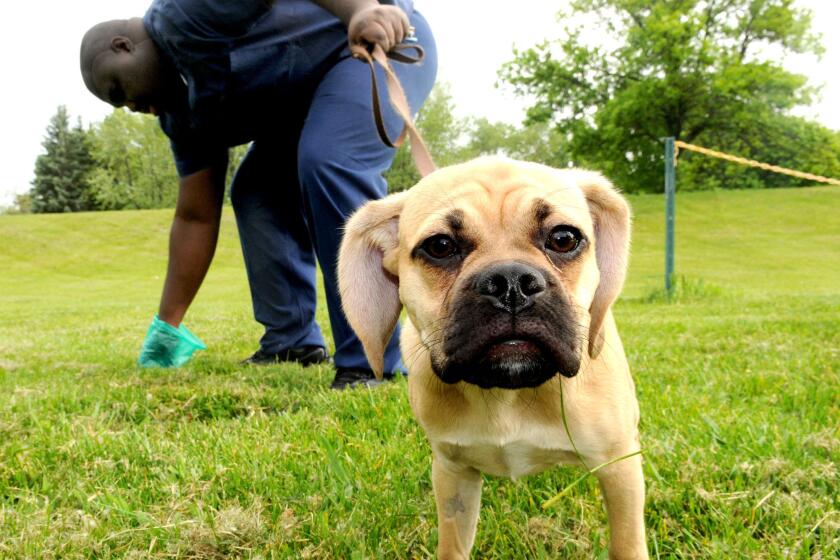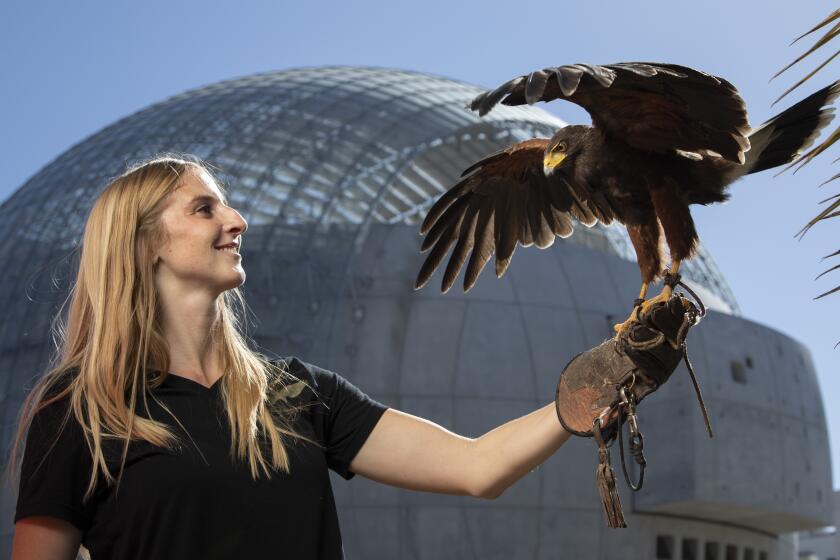Column: No partying with hippopotamuses, and other obscure L.A. laws

- Share via
Section 53.49 of the Los Angeles Municipal Code is a classic of lawyerly syntax and needless verbosity. It appears on a sign outside my local public library branch and reads as follows:
“It shall be unlawful for the owner or person having custody of any dog to fail to immediately remove and dispose of, in a sanitary manner, by replacing in a closed or sealed container and depositing in a trash receptacle, any feces deposited by such dog upon public or private property, without the consent of the public or private owner or person in lawful possession of the property, other than property owned or controlled by the owner or person having custody of such dog. The provisions of this subsection shall not apply to a blind person being accompanied by a guide dog.”
Were the lawyers who wrote that paid by the word?
Does a dog really “deposit” feces?
Is there an imaginable scenario in which someone would ask for consent to leave their dog’s feces on someone else’s property?
Opinion Columnist
Nicholas Goldberg
Nicholas Goldberg served 11 years as editor of the editorial page and is a former editor of the Op-Ed page and Sunday Opinion section.
I’m not a lawyer, but if I were in charge the sign would just say “Clean up after your dog,” with perhaps a further note that failing to do so is illegal.
Still, when I got home from the library the other day, I was curious. Was the city’s municipal code more amusing than I had previously realized? Was there more entertaining gobbledygook in it or was Section 53.49 an outlier?
The L.A. Municipal Code, for those who don’t know, is the compendium of the regulatory and penal ordinances of the city. Violations might get you fined or even tossed in jail. It was first adopted in 1936, though some provisions go back further. It has been amended continually and runs to about six volumes.
Going for a walk is one of the few outdoor activities we’re still allowed to do under California’s coronavirus lockdown. Stop ruining it.
I flipped through the code — online, of course — to Section 53, and, to be honest, I couldn’t stop reading. It’s the part of the code that deals with “animals and fowls.” Other parts address public health, public welfare, zoning, businesses and traffic, among other things. But I stuck with animals and fowls.
Just a few items away from Section 53.49, I stumbled on Section 53.47, which says:
“No person shall let to a mare any stallion or jack, or let to a cow any bull, or let to a sow any boar, or let to a bitch any dog, or let to a nanny goat any goat, except within an enclosure so arranged as to obstruct such animals entirely from the view of all persons outside such enclosure.“
For a second or two, I wasn’t sure what was meant by “let to.” What were our city’s leaders trying to hide from view behind an enclosure? But then the light bulb went on.
Spencer the hawk’s job: Discourage other birds that might dirty the gleaming, glass building. Why hawks like him command top dollar.
Does this even belong in the code? To my knowledge there’s no current crisis involving boars and sows copulating in public view and offending the sensibilities of Angelenos. Besides, didn’t generations of Americans learn about sex by watching animals go at it on the farm? Was that so bad? No doubt this ordinance was adopted at the behest of some previous-era Ron DeSantis hoping to stamp out woke barnyard sex-ed.
The rule dates back at least to the original 1936 municipal code, according to the helpful librarians at the L.A. Law Library. And possibly well before that.
It is no doubt one of many provisions that are no longer relevant or enforced but remain on the books because nobody has bothered to remove them.
Another section of the code bans the feeding of pigeons — but not everywhere in the city. Only here:
“Beginning at the intersection of the center line of First Street with the center line of Los Angeles Street; thence southwesterly along the center line of Los Angeles Street to the center line of Eighth Street; thence northwesterly along the center line of Eighth Street to the center line of Main Street; thence southwesterly along the center line of Main Street to the center line of Ninth Street; thence northwesterly along the center line of Ninth Street to the center line of Olive Street; thence northeasterly along the center line of Olive Street to the center line of Eighth Street; thence northwesterly… .”
The delineation of the no-feeding zone goes on for a hundred more words, along 9th, Flower and Figueroa, then back to Olive, over to 1st and down to Los Angeles Street again.
I realize that precision and specificity is essential to the law, so I won’t complain about that. But why am I forbidden to feed a pigeon at Olive and 4th but permitted to do so with impunity at Grand and 4th? Did an influential lobby of Grand Street pigeon feeders carve out a privilege for themselves, or are the lines merely arbitrary?
Colombia wants to send at least 70 hippopotamuses that live near Pablo Escobar’s former ranch to India and Mexico.
A few more rules from the code:
—Bullfights are prohibited in L.A.
—It’s illegal to sell ducklings under four weeks of age in quantities less than six.
—Wild, exotic or dangerous animals may not be exhibited at house parties or loud or unruly gatherings.
What animals does the city consider wild, exotic or dangerous? The code specifies hippopotamuses, rhinoceroses, moose, giraffes, baboons and reptiles over 8 feet long, among others.
So, if you live in the city of L.A. and you have a hippopotamus and you’re planning an unruly party, consider yourself warned.
While you’re at it, when you take it out, you might want to carry a really big sealed container to dispose of any mess it might deposit on a neighbor’s property. Unless you’re blind, in which case you can just ignore it.
More to Read
A cure for the common opinion
Get thought-provoking perspectives with our weekly newsletter.
You may occasionally receive promotional content from the Los Angeles Times.















